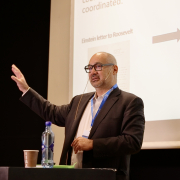Data power and moonshots
The Cancer Mission Hub Norway arranged its yearly high-level meeting for the fourth time.
The cancer mission is bold, concrete, and measurable, aiming to change a key challenge in society, namely how we jointly approach cancer. It is about understanding, preventing, diagnosing, treating, and following up cancer patients and their families, and it aims to improve the lives of three million people by 2030.
The goal of the Norwegian Mission Hub, one of the first cancer mission hubs established in Europe, is to work jointly on this societal challenge in effective ways.
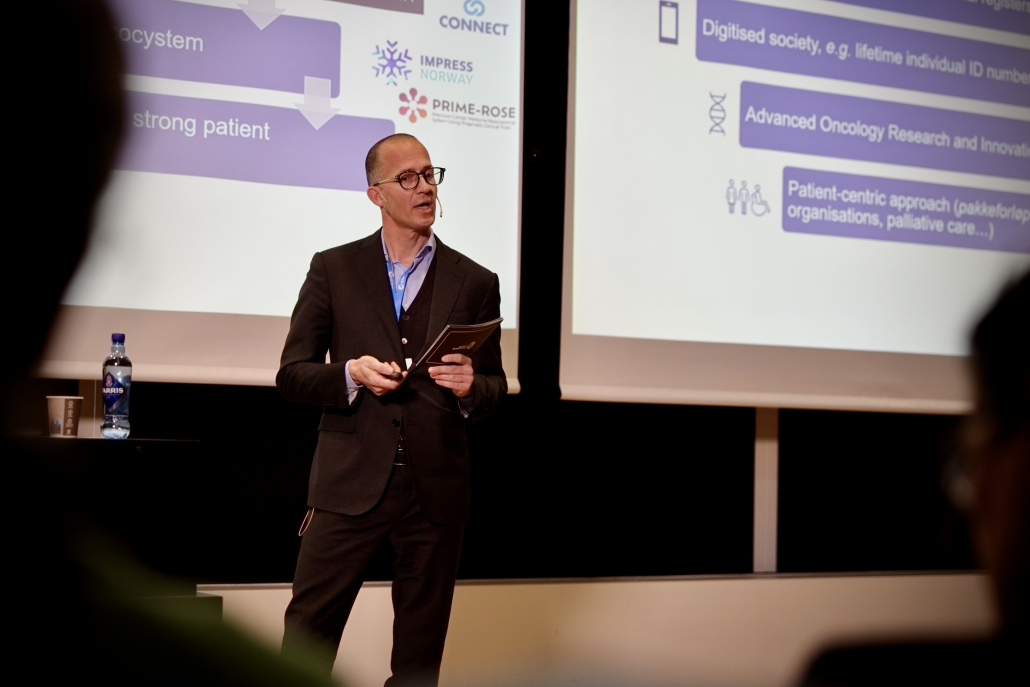
Ketil Widerberg, the general manager of Oslo Cancer Cluster, opened the high-level meeting on 19 December 2023. Photo: Oslo Cancer Cluster
EU’s holistic approach
The first keynote speaker on the programme was Cathrine Marie Lofthus, Secretary General of the Norwegian Ministry of Health and Care Services. She underlined that Norway shares the same cancer challenges as the EU states.
“We commend the holistic approach chosen by the EU,” Lofthus said and underlined how Norway is in line with the EU in the cancer mission.
Her ministry is on the verge of presenting a new national cancer strategy next year, replacing the current strategy called Living with cancer.
“We will pay more attention to the patient’s psychosocial health needs and the need for follow-up in the new cancer strategy.” Cathrine Lofthus.
Genetic testing is also one of the areas with more emphasis in the new strategy.
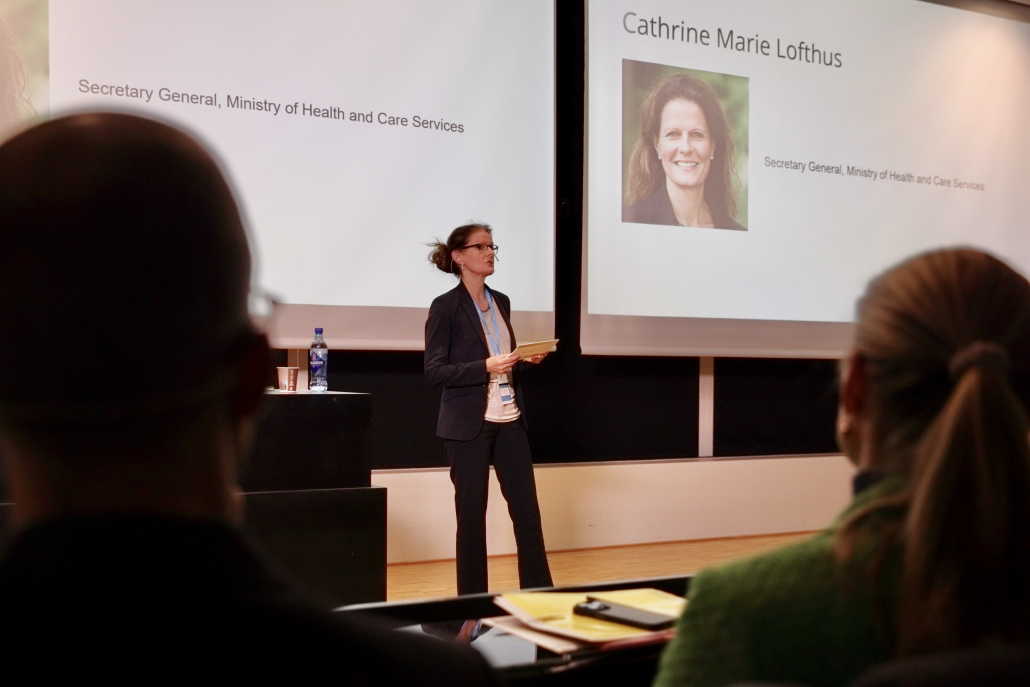
Cathrine Marie Lofthus, Secretary General of the Norwegian Ministry of Health and Care Services, underlined that Norway shares the same cancer challenges as the EU states. Photo: Oslo Cancer Cluster
Harnessing the power of data
The second keynote address was by Mark Lawler, Associate pro-vice-chancellor, professor of digital health, and chair in translational cancer genomics at Queen’s University Belfast. He spoke about the research project European Groundshot: Reimagining cancer research and its implementation across Europe.
“If you will remember only one thing from my speech: Data eats opinion for lunch.” Mark Lawler
The research project European Groundshot looked at the impact of Covid 19 on cancer screenings and diagnosis, investigating the impact of real-time data analysis from Hospital Trust across the UK.
“And we were shocked,” Mark Lawler said to an attentive audience.
One of the findings was that 7 out of 10 people with a suspicion of cancer were neither going to their GP nor a specialist for help.
Another was that the war in Ukraine does have an impact on cancer in Europe since Ukraine and Russia are two big contributors to clinical trials in cancer.
A third point was that health research is very important, and effective, to improve people’s health, and should be seen as an investment in our health.
“Working together does make sense,” said Mark Lawler, and added that comprehensive cancer centers do lead to better cancer care.
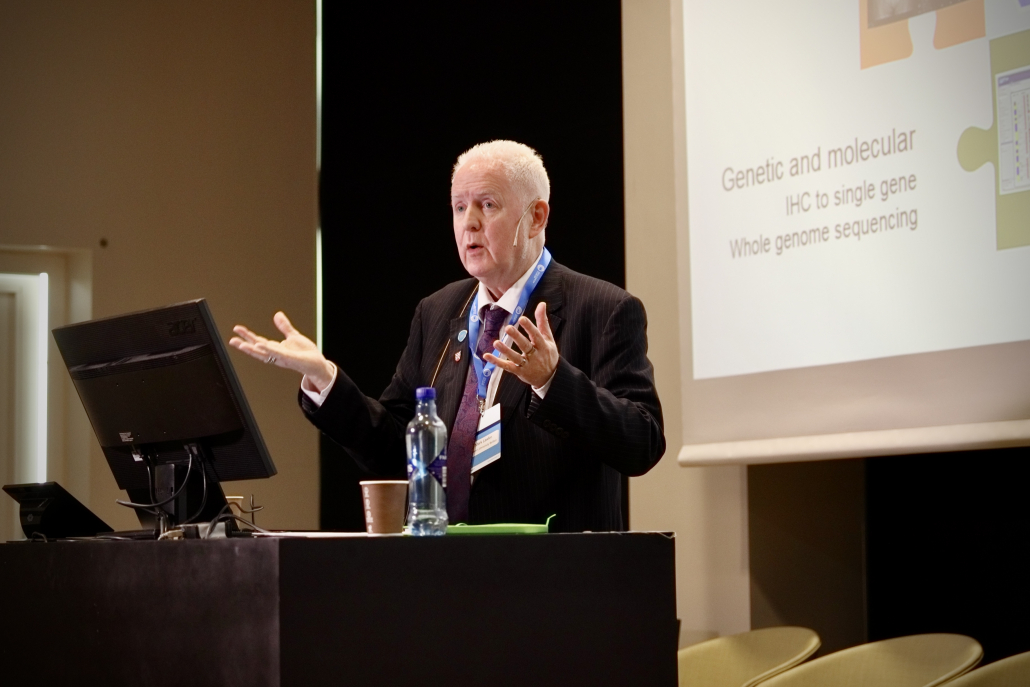
Profesor Mark Lawler presented the research project European Groundshot: Reimagining cancer research and its implementation across Europe. Photo: Oslo Cancer Cluster
- You can find out more details about the research project European Groundshot in this article on the webpage of Queen’s University Belfast.
- Here are the ten recommendations to the UK government on a national cancer plan, which Mark Lawler recently contributed to.
Cancer Moonshot 3.0
The third keynote address was a perspective from the US Cancer Moonshot, by Jason Paragas, CEO DVLP Medicines, Former Director of Innovation, Lawrence Livermore National Laboratory & Ex Officio member of the Blue-Ribbon Panel.
“In our government, everybody is in favor of coordination, but nobody wants to be coordinated. That is what a moonshot truly is,” Jason Paragas said, continuing with a reference to Albert Einstein’s letter to US President Franklin Roosevelt in 1939, and the outcome of this letter, the Manhattan Project.
Read the story of the letter that sparked the atomic bomb on the webpage of the American Museum of Natural History.
“What makes a successful Moonshot: a clear goal that is only possible from collective action.” Jason Paragas
The outcomes from successful moonshot programs can be these, Paragas argued: The US testing weapons on supercomputers instead of in the desert. As a bonus, we have supercomputers evolving from this goal, becoming increasingly faster and more powerful. Another example is the outcome of the single goal of Operation Warp Speed: a functioning vaccine technology against Covid 19.
“And where did we fail with moonshots? I will argue that it is the Cancer Moonshot. It did not have a clear single goal.”
So, what can we do? This is the question to use to frame a moonshot. Jason Paragas lists these questions to spark our imagination:
- Can we diagnose all cancers by stage 0-1?
- Can we make 100 % of all cancers targetable?
- Can we make cancer the 10th leading cause of death?
- Can we diagnose cancer right 100% of the time?
What is the one goal?
After the keynote addresses, the high-level meeting facilitated three moderated panel discussions. The first was called Global cooperation in cancer with societal impact and was moderated by Ketil Widerberg. His first question was an encouragement to think in the moonshot way: What would be – from your angle, a bold, concrete, and measurable action we should take tomorrow to reach the cancer mission’s objective?
“We need a quick win,” Mark Lawler said, following up with a concrete quick-win goal in cancer that we can collaborate on across borders:
“We can eliminate HPV-cancers, we can do that as a collective in Europe.”
Toward the end of the discussion, Widerberg repeated this first question. Would he get other answers? Here are some of the answers he got:
- We can start with a work package on health data.
- Let us cut the time it takes research to become treatment in half.
- A lesson from technology is that we need a multisided platform. Start with one problem in Norwegian health data, with cancer, and solve other health issues in addition.
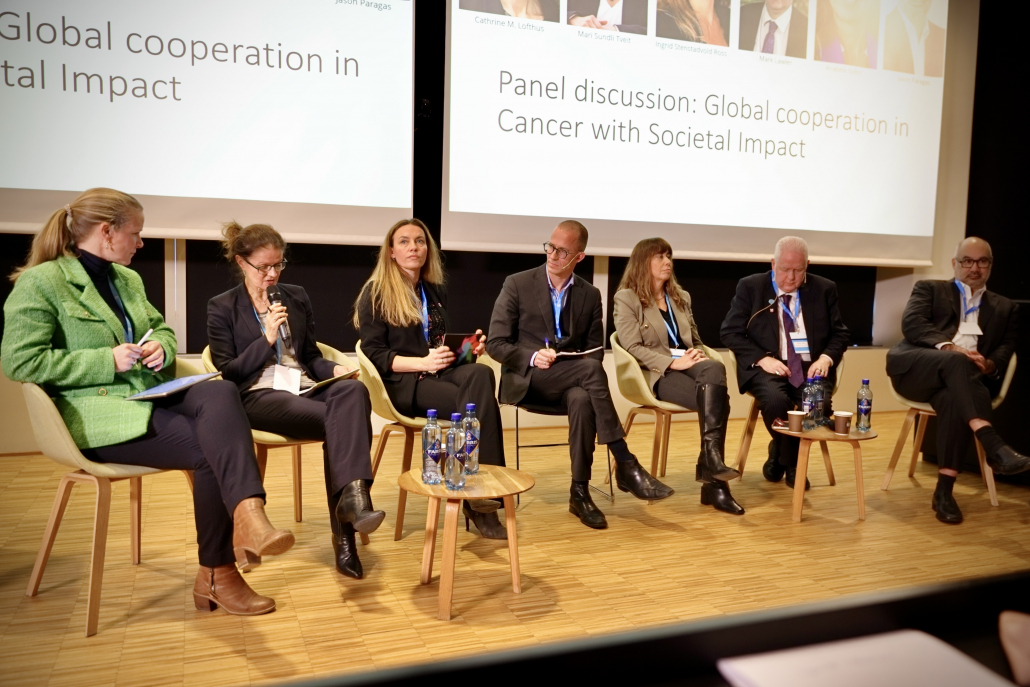
In the first panel we met: Mari Sundli Tveit, Chief Executive, Research Council of Norway, Cathrine Lofthus, Secretary General, the Norwegian Ministry of Health and Care Service, Ingrid S. Ross, General Secretary, Norwegian Cancer Society, Ketil Widerberg, General Manager Oslo Cancer Cluster (Moderator), Anabela Isidro, Coordinator ECHoS, AICIB (Agency for Clinical Research and Biomedical Innovation), Mark Lawler, Associate Pro-vice-chancellor, Professor of digital health, and Chair in translational cancer genomics, Queen’s University Belfast, and Jason Paragas, CEO DVLP Medicines, Former Director of Innovation, Lawrence Livermore National Laboratory & Ex Officio member of the Blue-Ribbon Panel. Photo: Oslo Cancer Cluster
The most important advice
The second panel was a conversation including the Norwegian reflections on the common effort in the cancer mission. Ingrid Stenstadvold Ross, General Secretary of the Norwegian Cancer Society, moderated the panel. She asked: What is the most important advice for the mission hub?
“To involve politicians and get commitment from the top is important to succeed with missions. Another advice is to monitor the projects that are set in motion and set interim goals. Also, it is to collaborate with others than the ones you apply for research funding with,” said Espen Solberg, Research Leader at the Norwegian Institute for Research and Education Studies (NIFU).
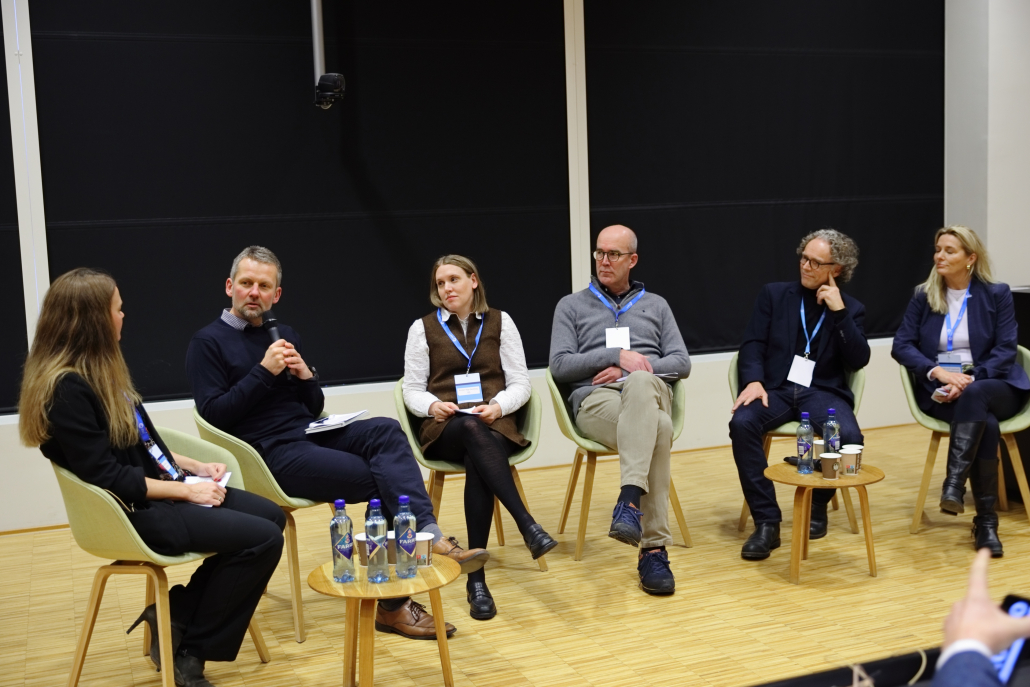
In the panel from the left: Ingrid Stenstadvold Ross, General Secretary, Norwegian Cancer Society, moderated the panel with Espen Solberg, Research leader, NIFU, Kirsten Viga Skretting, Special Advisor, KS, Oddbjørn Straume, professor and senior physician, Haukeland University Hospital, Knut-Inge Klepp, director Mental and Physical Health, Norwegian Institute of Public Health, Sissi Leyell Espetvedt, Special Advisor, the Norwegian Directorate of Health. Photo: Oslo Cancer Cluster
Wanting the same thing
The third panel was a conversation about the engagement of the health industry in a mission-oriented innovation system, and ways of collaboration. Ole Johan Borge, Director of health and public sector at the Research Council of Norway, moderated the panel, and asked the question: What is your strategy to start new initiatives and pave the way towards so-called impossible solutions?
“It is important to want something and then work systematically with this one thing,” said Kjetil Taskén, Director of the Institute of Cancer Research at Oslo University Hospital.
Taskén won the Innovation Prize of the University of Oslo earlier this year and is the coordinator of a large new EU project called PRIME ROSE.
“And everyone has to want the same thing, it cannot be about single institutions or even single countries,” Taskén added.
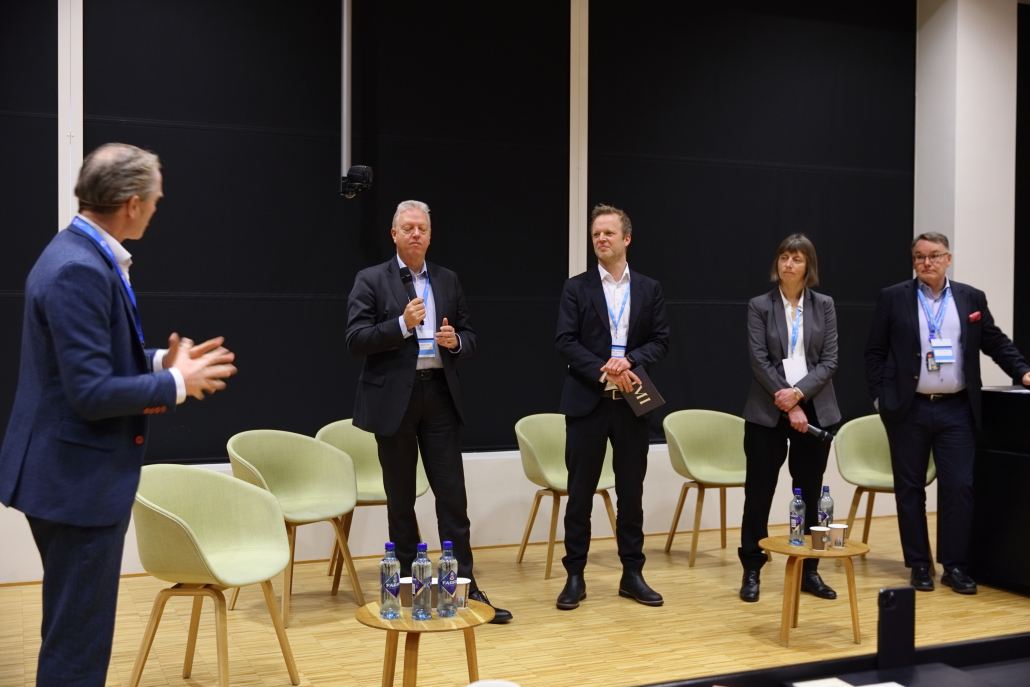
In the panel from the left: Ole Johan Borge, Director Health and public sector, the Research Council of Norway, was moderating the panel with Arild Kristensen, CEO at the Norwegian Smart Care Cluster, Leif Rune Skymoen, Managing Director the Association of the Pharmaceutical Industry in Norway (LMI), Giske Ursin, Director at the Cancer Registry of Norway, Ketil Taskén, Director of Institute of Cancer Research at Oslo University Hospital. Photo Oslo Cancer Cluster
Read more about our EU Cancer Mission initiatives and the work of the Mission Hub in these articles from our archive:

